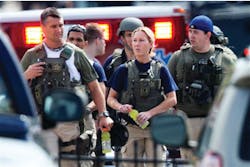Ramsey Urges More Reality-Based Training for Police
As police officers entered Building 197 at the Navy Yard in Washington, D.C. on Sept. 16, they came upon a wounded security guard. After determining that the guard was dead, one of the officers took his identification card and the group continued their search for the gunman.
That card was used to access secured areas of the building and may have played an instrumental role in locating suspected gunman Aaron Alexis, who police fatally shot after he killed 12 people in the building.
The presence of mind of the officer who took the ID is something other officers must emulate in active shooter situations, Philadelphia Police Commissioner Charles Ramsey told Officer.com Editor Frank Borelli at the 120th Annual International Association of Chiefs of Police Conference and Exposition.
Through the increased use of reality-based training, Ramsey -- who is president of both the Major Cities Chiefs Association and the Police Executive Research Forum -- believes officers will be bettered prepared for high-pressure situations.
"Putting people in stressful situations and simulations has proven to be pretty effective when they really get immersed into a particular scenario to at least see how they're going to respond," he said. "It reinforces a lot of things. Something as simple as that ID card; I don't know if I would of thought of that.
"Not everybody is going to be able to make those kinds of good decisions under pressure, but I do think that the more reality-based training that we provide, the more we put people in stressful situations to make them respond and make them react."
Ramsey added that in order for the training to truly be effective, it can't be predictable.
"Not to where they can tell their buddy 'I just went through the training and they're going to do X, Y and Z,' " he said. "Change it up. You never know what you're going to get because that's reality. The more we can do that, the more I think we can respond under pressure."
Of course, reality-based training and simulators cost money -- something that is tight for many police agencies in the current economic climate. Because of this, Ramsey said that more than ever, police officials need to communicate that need to those who hold the purse strings.
"We have to sell it. We have to show the value, we have to really let our elected leaders and our finance people understand we're not just asking for more money for training," he said. "We tend not to do that. We tend to say that we need more for whatever and they can just ignore it."
Ramsey said that the reality is that departments will have to plead their case more when requesting resources, and that includes staffing.
"Things are starting to come back. I don't think we'll get back to the levels we were at prior to the recession. Part of that is because crime rates are continuing to go down," he said.
"We do need more, but it's hard to make that argument when you've got competing demands. We are a big part of any city's budget, but there were other priorities that were put on hold during the recession as well."
About the Author
Paul Peluso
Editor
Paul Peluso is the Managing Editor of OFFICER Magazine and has been with the Officer Media Group since 2006. He began as an Associate Editor, writing and editing content for Officer.com. Previously, Paul worked as a reporter for several newspapers in the suburbs of Baltimore, MD.

